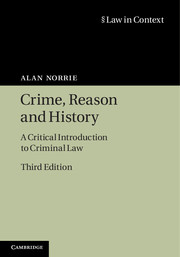Book contents
- Frontmatter
- Dedication
- Contents
- Preface to the third edition
- Preface to the second edition
- Preface to the first edition
- Table of cases
- Table of statutes
- Prologue: A brief history of the ancient juridical city of Fictionopolis
- Part I Context
- Part II Mens rea
- Part III Actus reus
- Part IV Defences
- Part V Concluding
- 12 Sentencing
- 13 Conclusion
- Bibliography
- Index
13 - Conclusion
Published online by Cambridge University Press: 05 October 2014
- Frontmatter
- Dedication
- Contents
- Preface to the third edition
- Preface to the second edition
- Preface to the first edition
- Table of cases
- Table of statutes
- Prologue: A brief history of the ancient juridical city of Fictionopolis
- Part I Context
- Part II Mens rea
- Part III Actus reus
- Part IV Defences
- Part V Concluding
- 12 Sentencing
- 13 Conclusion
- Bibliography
- Index
Summary
And this universal language (law) comes just at the right time to lend a new strength to the psychology of the masters: it allows it always to take other men as objects, to describe and condemn at one stroke. It is an adjectival psychology, it knows only how to endow its victims with epithets, it is ignorant of everything about the actions themselves, save the guilty category into which they are forced to fit.
(Barthes, 1973, 45)When a science goes round in circles without managing to overcome its contradictions it is always because it is based on concepts, on a definition of its object, which have not been subjected to a sufficiently radical critique, one which is sufficiently well-informed philosophically.
(Sève, 1975, 20)The political nature of juridical individualism
In Chapter 1, I outlined the principles of individual justice and rational legalism which underlie the orthodox theory and practice of criminal law, and indicated at the same time the ambivalence within that theory to them. In Chapter 2, I suggested that the time had come to move beyond attempts to shore up or reconstruct the criminal law so as better to match principle to practice. I proposed a historical approach to the principles of the criminal law, and identified the link between the legal forms of social control that emerged in the early nineteenth century and the ideologies of the Enlightenment.
The link was provided by the two Enlightenment-inspired philosophies of retributivism and utilitarianism, and the key to understanding the nature of the law lay in the contradictions at the heart of these two philosophies of punishment. These contradictions were historically generated in the modern period by the interplay between an abstract individualist ideology of just punishment and the reality of crime as a social and political phenomenon. First, crime was the product of the conditions in which the lower social orders lived and against which they struggled, but in philosophical ideology it was the product of a free individual for which punishment was deserved. Second, this abstract ideology represented the social world as consensual, whereas in reality it was racked by social and political conflict.
- Type
- Chapter
- Information
- Crime, Reason and HistoryA Critical Introduction to Criminal Law, pp. 365 - 381Publisher: Cambridge University PressPrint publication year: 2014



